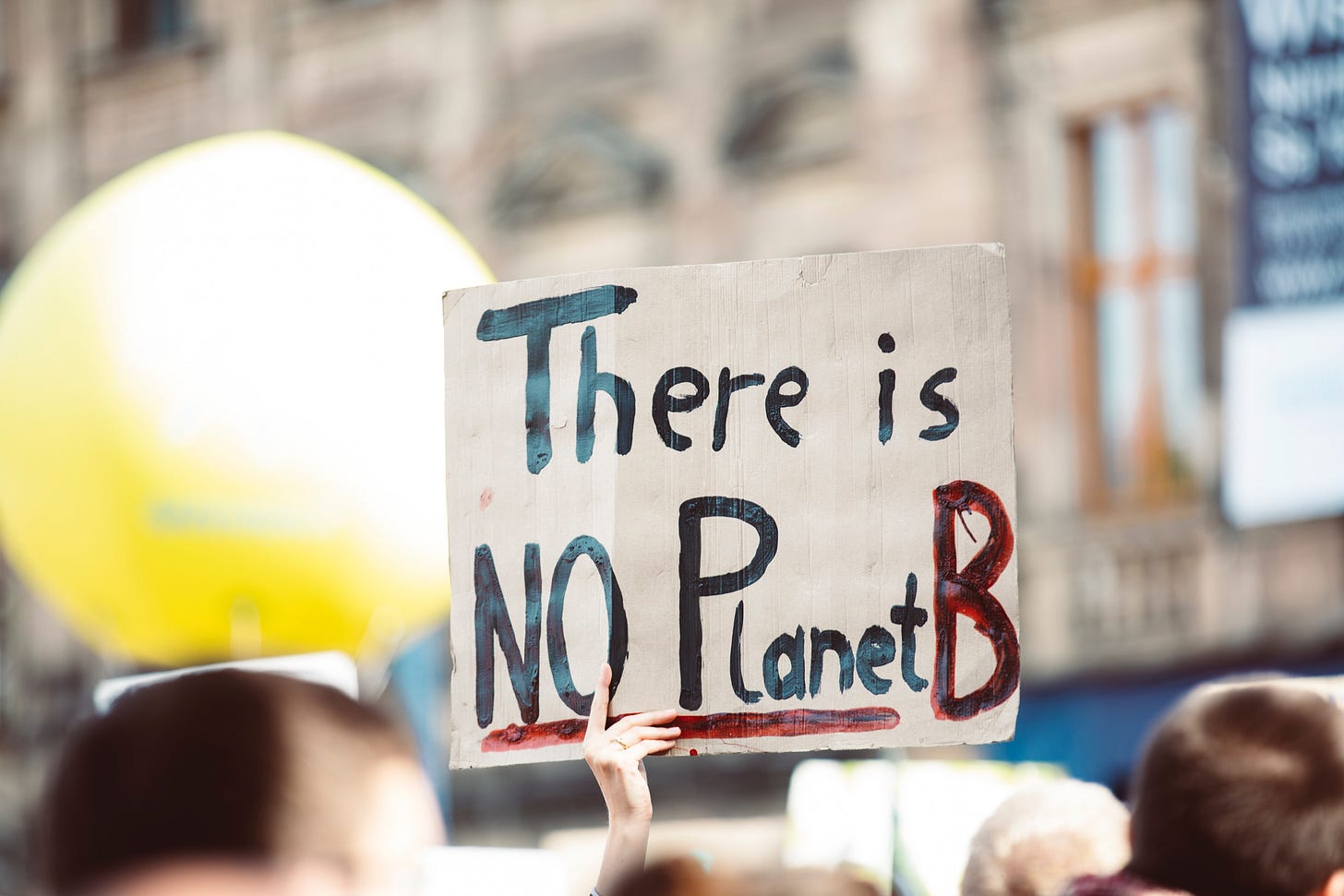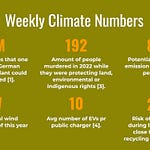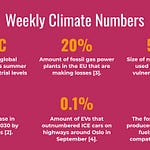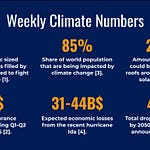Welcome to this weeks edition of The Weekly Climate and today with a slightly changed format, yay! 🎉

I’ve been spending a lot of time recently thinking about how to make the newsletter more action.oriented. I have gotten a few e-mails from some of you saying something like great newsletter, but I feel powerless, I want to act, I want to do something etc. And it has been rumbling around in my head how to help facilitate that.
If you’re like me you read the news here and in many cases you get pissed, angry, concerned, afraid and in the good cases maybe even inspired. You feel all these emotions but because there’s no action to take you end up feeling hopeless and maybe even helpless. It was never the intention with this newsletter to make your day worse. But I figured that these feelings represent a opportunity to do something. That’s what negative emotions are for: To prompt a change about your experience. So this week I’m trying a new format and I can’t wait to know what you think about it! Here are the changes:
There will be two main sections: “In the news” and “One way to take action”
“In the news” will feature the same amount of stories as earlier and the same categories except they will be much briefer. More like the “quick overview” before but with links.
“One way to take action” will dive into a theme or story from this week and figure out how to take action on that. I obviously encourage everybody to share what they’ve been doing in the comments section in this newsletter.
I hope this new format will help harness the desire to act and do something. And I definitely want your feedback! Please reach out or comment below!
📰 In the news
Here are the most interesting and important news items from last week!
🇺🇸 Story we follow: U.S. Presidential Election
The U.S. is a major emitter and are run by a climate sceptic and fossil fuel friendly… person. We need a change. And after Joe Biden was elected as the democratic candidate that change has to be him. Hence we keep a close watch on his climate aspirations.
Biden schooled Trump on environmental issues in last week’s debate
Trump says that Biden will listen to the scientists. Great let’s vote for the latter guy.
☠️ Story we follow: BPs climate aspirations
BP has announced that it will slash oil production by 40%. If history teaches us anything it is that this will be just another load of bullcrap just like Beyond Petroleum were 20 years ago. But we will see. By putting the story up top here we aim to track it carefully.
BPs almost disappeared from the news, which is interesting. I found a few items below.
Climate & Science
💧The Arctic Sea is not freezing yet at the latest date ever
🔥 3 out of the 4 largest wildfires in Colorado’s history was started… in July
🌿 The cheapest climate solution is giving half the planet back to nature.
Technology
⚡️Lots of news about virtual power plants this week and an excellent 101 by The Verge
🛰 Asset managers are increasingly turning to satellite imaging to assess climate risks for their investments. Here’s a great detailed overview of combining IPCC climate models with satellite data to quantify climate risk.
Startups
⚛️ Nuclear startup NuScale’s first plant receives support from the US government.
Investing
📉An analysis shows that the recent divestment trend means that oil and gas will soon follow a similar path as coal.
🥄 A report has found that to support the energy transition we need to invest 1 trillion dollar in mining.
🌞 20% of all utility-scale solar installations are being built by corporates.
Major Carbon Emitters
☠️ Exxon attacked the authors who revealed everything about how they have misled and manipulated the public on climate change again. 💪We’re going to deep dive into this in the “One action” part of this newsletter.
👶 Air pollution (from fossil fuels et.al) is killing 500.000 babies every year mostly in the developing world and 226.000 people die prematurely in the Mediterranean.
🏘 Our favorite podcast Drilled launched a local edition to keep a focus on climate accountability on a state-level in the U.S. Who’s doing Amy’s work here in the EU? (E-mail me I really want to know or find someone who want to start doing it)
Politics
🇪🇺 EU just voted to stop protecting our peatlands and keep on supporting good old fashioned dirty agriculture. So much for EUs “ambitious” climate plans.
🇵🇱 Poland strikes an 18B$ deal with the U.S. on nuclear power
🌲 Solar companies in South Korea have sued the government for their support on biomass. How about doing this in the EU?
Climate Justice:
🛢 A nightmare named Total in Uganda on the companies exploitation of the country by blocking farmers access to their own land.
❤️A beautiful and important story about how indigenous people in Indonesia managed to protect their forest.
All we can save bookclub and other books
🤓 Unfortunately, there were no “All we can save” bookclub this week. Probably people are still busy with week 2.
👀 A newly published book displays in great detail how humans have changed the surface of the Earth.
Key podcasts
Generation Green New Deal — S1E5 Detroit, Engine of the Green New Deal: A disturbing case of the fossil fuel industry making people sick in a poor neighborhood.
A matter of degrees — We Have the Solutions Now: A great look at the obvious fact we have the solutions, so what’s stopping us?
How to save a planet — Cold Hard Cash for Your Greenhouse Gas: This one was eye opening to me especially in terms of how much supermarkets pollutes with the most dangerous of all greenhouse gases.
Drilled — S5E5 The Big Guns: Chevron kicks things up a notch.
💪One way to take action: Fossil fuel industry
The Problem: We’ve been and are being fucked by the fossil fuel industry
The news item from this week that got me pissed the most was the news that Exxon launched a new attack on the authors who revealed that Exxon and the rest of the fossil fuel industry have misled the public about climate change. However, in doing so they accidentally revealed how fucking horrible for humanity that one company is and has been. Not only are companies like Exxon responsible for the deaths of 500.000 babies and a total of 7 million people world wide every freaking year, but they keep on trying to mislead all of us and keep our the veins of our economies pumped full of black oil, gas and coal. And I willfully used the word “responsible” because it was one thing if they didn’t know the impact of their products but that’s what the original paper by Naomi Oreskes showed that they did. Had they tried to change and tried to affect politicians to switch to cleaner forms of electricity then it would have been a different matter. But they didn’t and aren’t instead they launch and launched lobby orgs, propaganda campaigns and publicly said the opposite of the what their own scientists said. If you think I’m joking or exaggerating I can highly recommend listening to the 30 minute Generation Green New Deal episode from 2 weeks ago which recaps much of this. And here’s a quick video where AOC interviews one of the key researchers working for Exxon in 1980s during #ExxonKnew.

Solution(s): Transition now or die
There are two solutions to this: (1) The fossil fuel industry must transition now and/or (2) they must die. If you’ve read previous editions of this newsletter you will know that BP recently announced that they will cut 40% of their production. But then you will also know that a study has shown that none of the fossil fuel companies, not even BPs, decarbonization plans are anywhere close to the Paris targets according to a recent Carbon Tracker report. So that leaves one solution: Die.
How can we as individuals help accelerate the death of the fossil fuel industry? A climate concerned friend whom I respect very much recently asked me when I told him the fossil fuel industry must die, that isn’t this the job of NGOs? And yes NGOs like 350, Sunrise Movement are pushing heavily on this agenda, but that doesn’t mean that we as individuals can’t do anything. Remember that the biggest lie the devil, ahem fossil fuel industry, ever told was that we’re to blame for this.
One weakness that the fossil fuel industry has is money. You may think that they make a shit-ton of money from their exploitation of the Earth and all of us. But in fact it’s a heavily geared industry. In order for the industry to start drilling a new well (whether for oil or gas) they need two things: Insurance and a bank loan. Building these wells and the rigs needed are expensive so they need to borrow money from the banks. In fact the fossil fuel industry has taken up 2 trillion USD in debt over the last 3 years, but they have “only” made 2 trillion USD in profits over the last 30 years. So they need access to capital to extract more fossil fuels. They also need insurance on the wells they dig. And insurance and banks work in similar ways: If the industry’s they’re supporting has a social license to operate, then they keep on supporting them. But there’s a key indicator that they use to make this assessment (albeitly along with a whole host of other indicators) and that is the stock price of the fossil fuel companies. The stock price is an indication of investors belief that this particular company will keep on making money in the future. And that is what we the people can help affect.
To paraphrase a republican who didn’t do shit: “Those who think we are powerless to do anything about the greenhouse effect forget about the 'People Effect’”
One action: Divest
In the previous newsletters you may have read that this is already happening on a large scale and in fact this very newsletter published a similar story. You’ve probably read the reports that asset managers are putting increasing amounts of pressure on their portfolio to decarbonize, and that more and more big organizations like universities are divesting. This is all good and what we must continue to do. So here’s how you can help:
Bank: Take a look at the latest banking on climate change report. If your bank is on it either switch to one of the lower ones or one that’s not even on the list and be sure to tell your fossil fuel supporting bank why you’re leaving. Unfortunately, it doesn’t cover all banks so if your bank is not on there do some research google “bank name ESG” or something similar to find how they invest.
Insurance: Similar to banks figure out what insurance company you have and research how they invest their money and then find a better one.
Pension: WWF have made a couple of reports on pension funds in various countries and how their portfolios are made up. Here’s one for Danish pension funds, google “WWF <your country> pension rating” and see if they made one for your country. I found a couple of country reports this way. Unfortunately, at least in Denmark the pension is weird and locked in, but if you can switch away from the fossil fuel supporting ones then do it! And if you can’t switch, then voice your opinion at general assemblies. In Denmark we have Ansvarlig Fremtid who can even do that for you.
Vote: The biggest one obviously is use your power to vote for the greenest candidate in your political reality. This is obviously very relevant for our US readers these days. The politicians decide how to invest our hard earned tax money and at this point the fossil fuel industry gets 5 trillion $ in subsidies world wide.
And in case you’re wondering whether it’s working: It is.

Finally, probably the most important thing you can do is to tell your friends and family about how the fossil fuel industry is stealing our future, how they have manipulated us for half a century and what you can do about it. (There will be more ways to attack the fossil fuel industry in future newsletters 😼)
Community: Help us stranger
One thing I also would love to try with this new format is to create a community of people who like me want to do what they can to take action. So what I would love for you to do is that if you’re looking into personal divestment from fossil fuels that you:
Share your progress and what you’re working on in divestment
The dataset is not complete so if you research various banks, pension funds insurance companies, share which you researched and help other people out.
And the place to share it would be in the comments below. That way future readers can always easily find it. At the very least just share what you think about this action. Wouldn’t that be cool?
Learn more
Divestment
Fossil fuel industry
Drilled Podcast portrays everything the fossil fuel industry is doing and has done to our world, Amy Westervelt
Read the “Victory Memo” by the American Petroleum Institute to judge the industry’s climate change motives and google #exxonknew.
This changes everything and On Fire, Naomi Klein
Heated Newsletter, Emily Atkin
I can’t wait to hear what you think of this new format. Please send me your comments and feedback either on comments below or by e-mail: michael@weeklyclimate.com. Did you like the old one better? Do you like this one better?
That’s it for this week folks! If you feel like I’m missing something, please let me know.
If you enjoyed this newsletter don’t forget to share it with your friends, coworkers or other people you think could benefit from getting it. If you got directed here by a friend or another link on the Internet don’t forget to subscribe!
See you all next week 👋














Share this post